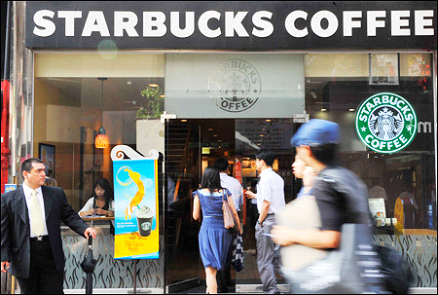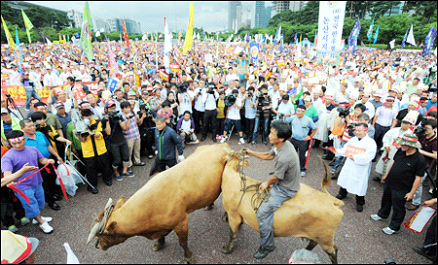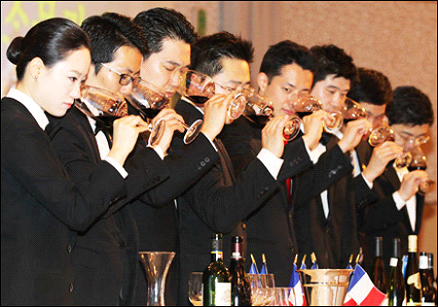
Market Information > 한국 농식품 시장뉴스
한국 농식품 시장뉴스
July 13, 2011
2011.07.13
1. BILATERAL/MULTILATERAL ISSUES
MIFAFF Minister states that FTA talks with China will not even begin unless rice, red pepper and beef are excluded from the discussions [Korean: BYK]
http://news.donga.com/3/all/20110712/38753664/1
Summary: Minister of Agriculture Kyu Yong Suh stated that the key point in holding FTA negotiations with
<7/9/2011> S. Korea and
The secret talks have raised concerns for the agricultural industry, which stands to incur billions in losses per year
http://english.hani.co.kr/arti/english_edition/e_business/486611.html
http://english.yonhapnews.co.kr/business/2011/07/13/39/0502000000AEN20110713000300315F.HTML
Summary: U.S. Secretary of State Hillary Clinton called Tuesday for an end to partisan strife over free trade agreements (FTAs) with
Fruits stalls Korea-Colombia FTA [English, MJF]
http://www.koreatimes.co.kr/www/news/biz/2011/07/123_90713.html
Summary: Both Korea and Colombia agree in principle on the need for a fast free trade agreement (FTA) but they just cannot nail it because Korea is not ready to accommodate what Colombia wants ― better terms for its fruits and flowers than what Korea gives Peru and Chile.
2. ECONOMIC ISSUES
Inflation causes drop in Starbucks sales[English, MJF]

3. GRAIN & OILSEED ISSUES
Mandatory labeling requirement of rice grade on package will be effective on November 2011. (Korean: CSC)
http://www.nongmin.com/article/ar_detail.htm?ar_id=189656&subMenu=articletotal
Summary: Mandatory labeling requirement of rice grade on package will be effective on November 2011. Current labeling requirement has been on the basis of voluntary. Korean government plans to implement of mandatorily labeling protein contents on the rice package from November 2012.
4. LIVESTOCK ISSUES
Pork and Beef Imports Surge in First Half of 2011 [English, CSY]
http://www.arirang.co.kr/News/News_View.asp?nseq=118036&code=Ne2&category=2
Full Text: Imports of pork and beef spiked in
Members of livestock-related interest groups stage a protest ..[English, MJF]

5. MARKETING ISSUES
Heavy rains,
http://english.donga.com/srv/service.php3?bicode=020000&biid=2011071352198
Summary: Torrential rains are pushing up the prices of farm products, burdening government attempts to control inflation. The price of gas will soon pass 2,000 won (1.87 U.S. dollars) per liter with oil companies ending their discount of 100 won (90 cents) per liter. Growing inflation risks also stem from China`s raising of raw material and food prices. According to the Korea Agro-Fisheries Trade Corp. Tuesday, the national average price of cabbage was 1,790 won (1.67 dollars) per head, up 21.9 percent from a week earlier. Lettuce went for 1,060 won (99 cents) per 100 grams, up 67.6 percent week-on-week. The price of spinach was up 40.1 percent to 5,370 won (5.02 dollars) per kilogram, and that of green pumpkin jumped 18.2 percent to 1,170 won (1.09 dollars). Additional heavy rains will hamper the freshness of vegetables and lower sugar content in fruit, resulting in a decline of harvest and supply. The government will supply 20 percent more cabbage through contract farming, but this is considered insufficient to immediately lower vegetable prices.
CJ plans to diversify into biotech and new markets [English, CSY]
http://joongangdaily.joins.com/article/view.asp?aid=2938783
Summary: CJ Cheiljedang, the nation’s biggest food manufacturer, said it will diversify its business into biotechnology as well as expanding its overseas markets for its food products. “Biotechnology, new materials and globalizing Korean food will be the major backbone businesses to transform the company into a global corporation,” said Kim Chul-ha, chief executive officer of CJ Cheiljedang, at a press conference yesterday.
36,000 New Hotel Rooms will be Added to
http://www.yonhapnews.co.kr/economy/2011/07/13/0301000000AKR20110713099900005.HTML?template=2089
Summary: The Ministry of Tourism announced on July 13 that it will help local hotel industry develop a total of 36,000 new hotel rooms in the
CJ Cheil Jedang aims to more than double sales [English, MJF]
http://www.koreatimes.co.kr/www/news/biz/2011/07/258_90733.html
Summary: CJ Cheil Jedang, a giant in the Korean food industry, is striving to more than double its sales in five years, from 6 trillion won (about $5.6 billion) in 2010 to 15 trillion won by 2015, based on strong performances in global markets.
The Seoul-based outfit looks to nurture three major pillars to underpin the ambitious goal of bioscience, new materials and globalization of Korean food or ``hansik.’’
6. OTHER MISCELLANEOUS ISSUES
Gov’t sets 2020 greenhouse targets [English, CSY]
http://joongangdaily.joins.com/article/view.asp?aid=2938782
Summary: The government for the first time set a timetable for reducing greenhouse gas emissions through 2020 by industry and sector, the Ministry of Knowledge Economy said in a release yesterday. Among the nation’s industries, manufacturers of flat-panel displays will be required to reduce greenhouse gas emissions the most, 39.5 percent, by 2020. The timetable was jointly announced by various government offices including the Ministry of Environment, the Ministry of Land, Transport and Maritime Affairs and the Ministry for Food, Agriculture, Forestry and Fisheries.
The government also plans to release mandatory timetables for the country’s 471 biggest energy-consuming companies in September for implementation next year. Companies that fail to abide by the schedule will first be given a warning and penalties thereafter. By 2020,
Biz bodies gripe at greenhouse gas reduction plan [English, CSY]
http://english.yonhapnews.co.kr/business/2011/07/12/44/0501000000AEN20110712008800320F.HTML
Summary:
Best sommelier in

Number of Smart Phone Users Reaches 15 Million in
http://www.yonhapnews.co.kr/economy/2011/07/12/0303000000AKR20110712191700017.HTML?template=2089
Summary: According to the telecommunication industry, total number of smart phone users in
The information in this report was compiled by the Agricultural Trade Office (ATO) at the U.S. Embassy in Seoul, South Korea. The press summaries contained herein do NOT reflect USDA, the U.S. Embassy, or other U.S. government agency official policy or view point. U.S. food exporters can learn more about market opportunities in South Korea by reviewing ATO Seoul’s Exporter Guide and other reports available at www.fas.usda.gov by clicking on “attaché reports”.
Agricultural Trade Office, U.S. Embassy - Seoul
Tel: 82-2-6951-6848 Fax: 82-2-720-7921
Email: atoseoul@state.gov